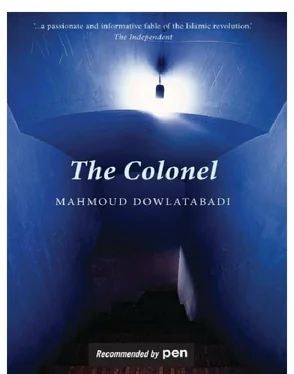“We beat people’s feet till they’re black as boots here!”
With the end of his cable whip he forced Amir’s head round to the left, to face the two blindfolded women who had collapsed onto old chairs and, before Amir could fix in his mind the lines on the face of the woman he thought might be Nur-Aqdas, Khezr took a step towards her. Amir looked away. As the sharp toe of Khezr’s shiny shoe connected with the bruised and bandaged legs of the nearest woman on the bloodstained couch, she let out a terrible scream and then fell silent. Khezr Javid now returned to the desk. He waved his whip at five of the prisoners in the room to indicate that they should be led back to the cells, then pointed at the sixth:
“The one with a moustache goes to administration.”
He looked round at the woman on the couch: “You… pissy old woman, have a think about it tonight. Tomorrow you either talk, or I send you off to join your two boys in Behesht-e Zahra. 37Take her to her cell, soldier!”
As the soldier led her away, leaving only the echo of her feeble whimpers in that dark and sinister room, the old woman looked as fragile as a blade of straw. Khezr sat down at his desk without looking at Amir or saying a word to him, lit himself a cigarette and began smoking it. After a long, frightening silence, Amir heard the sound of dragging footsteps coming to the interrogation room. He had no idea how much time had passed, or even what time of night it was. Khezr got up, came forward and twisted Amir’s head round, forcing him to look at his wife, who had been made to sit on the blood-soaked old couch by the door. A black blindfold covered her eyes and they had made ‘black boots’ of her feet. Khezr turned Amir’s head back again and moved back into the light. All of a sudden, Amir seemed to hear the screaming and wailing of all the women of the world spinning round the prison and reverberating in his skull until, as abruptly as if his spinal cord had been severed, he passed out. He remembered nothing until he came to on the wire bed and saw, on the lead-coloured steel table, a bloodstained knife in the pool of light under the anglepoise lamp.

“Here, have one of these cigarettes.”
Khezr’s eyes were bloodshot. Amir saw this, not in the feeble light of the ceiling lamp, but in his mind, which was still filled with the thought of those long, endless nights of interrogation. He could even remember every detail of Khezr Javid’s yawns. Tired and exhausted after a long day’s interrogation and getting over his drunkenness, Khezr would read through the response to the final question once more, and Amir would see him yawn and hear the gurgling noise in his throat. The Immortal Khezr did not seem to the colonel’s son Amir to be the same man as the one who was now sitting on the bed, spitting out olive stones and putting them on the edge of the plate. For that Khezr, the one in prison, had long since etched himself indelibly on Amir’s memory. Amir knew all his habits and foibles inside out. He knew that when he wanted to sleep, his drunken snores would not last more than an hour. There had been many occasions when he had set him a question and, stretching out on the camp-bed in a nook against the wall, had promptly had forty winks while Amir wrote down his answer. He would then get up, bright-eyed and bushy-tailed, and sit on the bedside, without even needing to splash water on his face to wake himself up. So now Amir was certain that Khezr was going to lie down on his bed for a short nap, but he could not be sure that he would sleep until morning. He did not dare ask him again about where he planned to sleep because, in all likelihood, he must have heard his conversation with Mohammad-Taqi and may have got the wrong idea about him. When Amir had come back down to the basement, he had seen a brief flash of suspicion cross Khezr’s beady eyes. That naked, ruthless look, which contained the whole burden of Khezr’s past, had stopped Amir dead in his tracks. His real personality — his brutal, overbearing nature — came flooding back. Khezr hasn’t changed; behind the friendly mask, he’s just the same as he always was, however much he tries to hide it. Amir would have to wait before Khezr would tell him what he wanted to know.
Khezr put down his empty glass, crossed his right leg over his left, undid his shoelaces and took off one of his shoes. Amir took it from him and put it in a corner, leaving Khezr’s hands free to undo the other one. As Amir placed it beside the other, he realised that Khezr was intending to stay the night. His heart sank, not least at the thought of Mohammad-Taqi’s pistol in the sitting room. The pistol on its own was cause enough for horror but, added to it, was Mohammad-Taqi’s alarming curiosity about Khezr, a curiosity blended with a suspicion that had turned into a certainty. Given what Amir knew about his brother’s state of mind, and in particular his belief that the revolution had to be brought about through violence, he was worried that Mohammad-Taqi would take out his pent-up feelings of hatred on an enemy who, in his view, was a well known agent of the destruction of a whole generation of his countrymen. There was bound to be a bloody outcome. Nowadays, there were any number of people, ordinary people on the street or bazaar folk, all looking for revenge, either on personal grounds or simply because it had become a national pastime. From every other tree lining the streets they were busy stringing up dozens of known police informers like Khezr the Immortal. To a hotheaded, vengeful young man like Mohammad-Taqi, who had lost so many of his comrades over the years, it would seem only natural, after more than half a century of oppression, to drag a police torturer out of his house and sacrifice him to the mad juggernaut of the revolution.
… But what am I supposed to do in this situation? The ancient tribal customs of our country still more or less obtain, albeit they may have faded somewhat, and one of them is the sacrosanct duty of a host to protect his guest — even if he is a sworn enemy. The pressures of city life may have made it harder to observe these customs, but one does not forget them .
Why was I inclined to take these laws of hospitality so seriously, as if it were some sacred duty to look after Khezr Javid? Didn’t I have every right to throw him out? Not one hair of my body is happy to have him in the house. I’m terrified of the consequences of having him here, but just as terrified of driving him away. If I have invoked custom and tradition, it is only because I was afraid. I have no doubt that if I saw Khezr in the street, I would just cross over to the other side. But now it is a different situation and I am trapped in a corner and I can’t see a way out of this fix.
“Penny for your thoughts, comrade?”
He had used the word ‘comrade’ ironically, of course. Amir had no idea where on earth his mind was wandering to. He turned round to look at Khezr. He was lying on the bed, half leaning on the pillows and half propped up on his right elbow. He was looking at the tumbler in his hand, which he had filled without offering any to Amir. He was swirling the arack gently round in the glass as Amir stammered back that he had not been thinking about anything.
“I’ll be sleeping here tonight.”
Khezr said this in a bullying, aggressive tone, boasting his self-confidence. With a smile dripping with artifice, Amir replied that there was a bed and that he would change the sheets.
Khezr said nothing and Amir realised that he was pretending that it did not matter. Khezr seemed to be feeling hot, for he got up to take off his jacket. When he reached up to hang it on the coat rack, Amir saw his shoulder holster with his side arm in it. Just as in the interrogation room, it hung off his left shoulder and was slightly angled so that he could easily reach the butt with his right hand and draw it. As Khezr sat down again, Amir could see the holster more clearly, with the black pistol butt sticking out of it. Khezr picked up the glass and, raising it to his lips, he grinned:
Читать дальше













